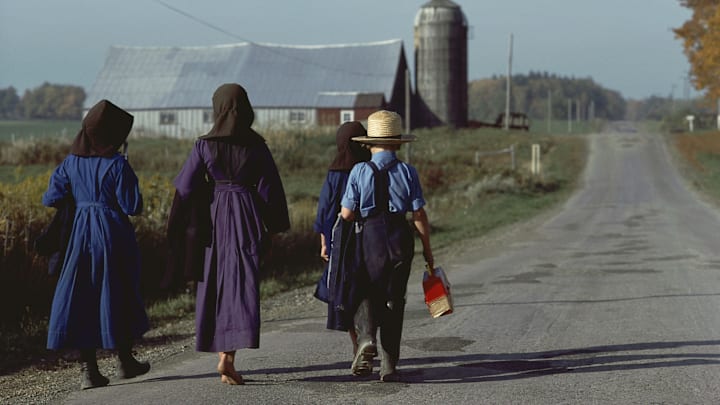There are a lot of myths and misconceptions surrounding the Amish that don’t stand up to scrutiny. Despite their reputation, they don’t shun technology or cars as much as you might think. Some laborers might use battery-powered tools, for example, or basic computers for their business; they'll hitch rides in vehicles if needed. But one stereotype is (mostly) accurate: The Amish don’t like having their picture taken.
So what do they do about the identification cards needed for everything from voting to writing checks? How do they provide proof of identity if they can’t present one with a photo? As it turns out, there are a few ways around this.
The Amish and Photography
To get you up to speed: When we refer to the Amish, we mean a population of traditionalists with a set of religious beliefs that originated in the Anabaptist movement of the 16th century. That Christian fellowship resulted in two factions: the Amish and the Mennonites. The former largely shuns modern conveniences and places the community focus on family and labor. The Amish are mostly found in the northeastern United States, with concentrations in Pennsylvania, Virginia, and Ohio, among other states. (Mennonites are a bit more liberal regarding contemporary living unless they’re part of the more conservative Old Order.)
Part of Amish doctrine is an aversion to “graven images,” or anything that promotes what they might perceive as vanity or an unnecessary focus on the individual, a rule derived from the Second Commandment of the Bible. For the most part, the Amish don’t take photos and don’t want pictures of themselves to be taken. In fact, a tourism page for the Amish-heavy area of Lancaster, Pennsylvania, implores visitors not to snap photos—though obviously, there’s no legal prohibition against doing so.
To say the Amish take the biblical caution against graven images seriously would be an understatement. In 2018, an Amish couple (their names were not revealed in media) filed a lawsuit against the federal government over mandates that the wife submit photographs as a part of an application for U.S. citizenship. (She was a legal immigrant from Canada.) Asserting the rule violated their religious beliefs, they brought the matter to court. The two parties settled in 2019, with the woman receiving a waiver. She is also allowed to enter and exit Canada without providing photo identification.
How the Amish Deal With IDs
Unless you’re getting a mug shot, photographs aren’t absolutely necessary, and it’s easy enough for the Amish to avoid a camera lens. However, identification cards seem like an insurmountable hurdle. The entire point of the cards is to provide proof of identity by matching the cardholder’s appearance to their photo. Refusing would make it difficult to get a loan or a driver’s license, pay by check, and so on.
But as with any religious group, state and local lawmakers have taken steps to avoid policies that might infringe of religious practice. In 2019, Virginia passed legislation that permitted IDs to be issued without a photo, one of 14 states with similar laws on the books. But they come with a caveat: The cards can’t be used for voting or driving. Philadelphia and Indiana have similar laws. (As most Amish don’t drive, the restrictions don’t appear to be a huge problem. Nor is a driver’s license required to operate a horse-and-buggy, though some communities in Indiana require them to register for a license plate.)
To minimize people falsely claiming religious objection to having a picture taken, Virginia mandates that applicants provide paperwork that proves they’re exempt from Social Security and Medicare based on their beliefs. States may stamp “valid without photo” on the ID itself to affirm its legitimacy.
The need for identification for the Amish is a relatively recent development. As they don’t usually drive automobiles or travel by plane, ID cards were not a high priority. But within the past decade or two, the community has found itself increasingly inconvenienced when IDs have been needed to buy cold medicine or pesticides, or for other once-mundane activities that have come under increased regulation.
Despite this option, there are still instances when religious beliefs and state law become hard to reconcile. In 2015, an Amish man filed a federal lawsuit in Pennsylvania after he was unable to purchase a firearm without photo identification. Other states have subsequently tried to introduce legislation that would permit those with religious exemptions to buy guns without photo ID.
This isn’t to say the Amish never opt for photo cards. Some Amish teens, for example, learn to drive and therefore submit to the Department of Motor Vehicles requirements for a photo-emblazoned permit or license. And the Amish sometimes ease their own mandates depending on practicality: A smartphone, for example, might make it easy for them to run a business, particularly when it necessitates contact with the world at large. Still, it’s unlikely photos—or worse, selfies—will be encouraged anytime soon.
Have you got a Big Question you'd like us to answer? If so, let us know by emailing us at bigquestions@mentalfloss.com.
Read More Answers to Big Questions:
